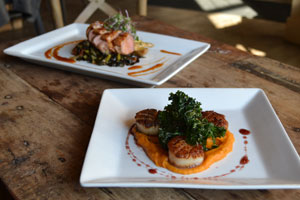Hot Dog!
Decadent dachshunds from around the Fox Cities
By Cameron Carrus
When attending a Timber Rattlers or Brewers game, it’s pretty much guaranteed that you are going to order a hot dog to bring back to your seat. Normally, no one gives the hot dog a second thought: it has been accepted, and even celebrated, as part of American culture – but the hot dog has a long, international history. Over a century has passed since the hot dog has reached United States shores, but the diversity of the treat continues to expand.
The German “dachshund” sausage, which translates to “little dog,” can be traced back to Frankfurt in the 15th century when vendors would serve sausages wrapped in rolls. The Fox Cities have a strong line of German ancestry, so it is possible that the ancient dachshund tradition was transplanted directly into this area. Nick Hoffman, curator of the History Museum at the Castle in Appleton, found in his research that the indigenous people of the Fox Cities were preserving meats similar to the dachshund sausage even before immigrants arrived.
Today, hot dogs have made their way into dining establishments and sporting events, but the tradition of street vending has remained strong. There are plenty of hot dog vendors to choose from in the Fox Cities: What’s Up Dog? in Menasha, Looy’s Dogs in Appleton, Juicy Jake’s Hevidog Cart and Hot Dog Charlie’s, both in Oshkosh, to name a few.
Hot Dog Charlie’s, run by Chuck Nichols, boasts a local production with a personal touch. Nichols gets his hot dogs, a pork and beef mixture cooked in natural casing, from Loehr’s Meat Service in Campbellsport, about an hour south of Oshkosh. His chili cheese dog is served with his own homemade chili, and he uses a creme brulee torch to caramelize the cheese streetside. He also serves a hot dog topped with “bacon sauce,” a homemade bacon chili. He offers “regular” hot dogs with an array of condiments: ketchups, mustards, Brewer’s secret sauce, Sweet Baby Ray’s barbeque and giardiniera (assorted pickled vegetables).
Nichols says that the hot dog street vending model works well partly due to the food’s convenience.
“Hot dogs are ready to go. You don’t need to wait for someone to fry up a burger,” he says, adding that purchasing hot dogs is a common impulse decision. “You just can’t resist when you smell one of those dogs on a Saturday night.”
Local street vendors, though in competition with each other, seem to unite on one issue: the “Wisconsinizing” of the Chicago-style dog.
“I don’t much like anything that comes out of Chicago,” says Scott Rogers, owner of What’s Up Dog? in Menasha. Rogers serves a Chicago-style dog, and calls it the “Wisconsin Dog,” because everything, right down to the condiments, are from the Dairy State. Nichols serves a “Wiscogo Dog,” in which he takes the ingredients of a Chicago-style dog (tomato slices, pickles, onions, relish and hot peppers), blends them in a food processor, and serves them on top of the sausage. Some say this makes the dog easier to eat, but it may just be the perfect cover for executing Chicago’s trademark toppings.
Though some establishments put a new spin on the traditional Chicago-style dog, other restaurants play towards the undeniable population of Chicago transplants in the Fox Cities. Abbas Amin, owner of the Chicago Grill in Appleton, says that in his restaurant “[the hot dogs] aren’t like Chicago…they are Chicago.” Poppy seed buns are shipped up from Turano Bakery in Chicago daily, and he uses Vienna all-beef dogs, just like in the city. “A lot of people love Chicago as a city, and good food comes from the big cities,” Amin asserts.
Similarly, Kassem Meiss, owner of Taste of the Windy City in Little Chute, says that some of his customers are Chicago natives. “If they’re from Chicago originally, they want a taste of home,” Meiss says. Taste of the Windy City also uses Vienna all-beef dogs, which Meiss points out is a great option for diners who do not eat pork. Lastly, Meiss comments on the visual appeal of the Chicago-style dog. The color contrast of the poppy seed bun, with the onion white, relish green, tomato red and pickle spear on top has its own appeal. For the health conscious looking to justify their meal, Meiss describes it as a “salad on top of a hot dog.”
For adventurous eaters, there are many untraditional options available in the area as well. Taste of the Windy City offers a “pizza dog” topped with marinara sauce and mozzarella cheese. Chicago Grill offers a veggie dog with Chicago-style toppings, an evolution that has been made to cater to non-meat eaters.
The hot dog has even made its way into gourmet cuisine. Bob Wall, owner and chef at the Green Gecko Grocer and Deli in Appleton’s City Center, offers a “Gecko Dog” topped with curried onion olive relish, tomato and pickle. Wall explains that he used the relish on sandwiches already, so he decided to try it on the hot dog. “The pickle and tomato bring out the flavor of the relish,” he adds.
The cross-section of hot dog options in the Fox Cities represents the cross-section of people in America. Brought over by European immigrants, the hot dog has been adapted into an Americana classic. Yet, the Fox Cities are comprised of immigrants from around the world. Whether you prefer a chili dog or pizza dog, curried relish or regular, ketchup or mustard, Chicago or Wisconsin, one fact is certain: the hot dog itself is the lowest common denominator that unites us all.
Down South Dogs
Rod Brady, owner at Jambalaya’s Authentic Cajun Catering in Appleton and the new Jambalaya House in Green Bay, has brought a cut of his native Louisiana culture to the Fox Cities. Brady ships alligator sausage (70 percent alligator meat to 30 percent pork) up from Louisiana. He serves it in a “gator wrap,” where it is dressed with lettuce, tomato, pickle and mayonnaise like a po’ boy, served in a tortilla. If you’re on the go, you can also get an alligator sausage on a stick.
But the best seller has been the alligator brat. Brady serves the sausage in a hot dog bun, and tops it with cheddar cheese, diced onions, and a remoulade sauce, a cajun mayo. Brady says he wanted to use the name “brat” to see how Wisconsinites would respond to it.
“We’ve sold a ton of [brats],” he reports. Alligator sausage is consistently on Brady’s menu. Upon special request for catering events, Brady also offers crawfish sausage.
—FC










Leave a Comment